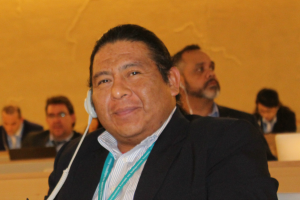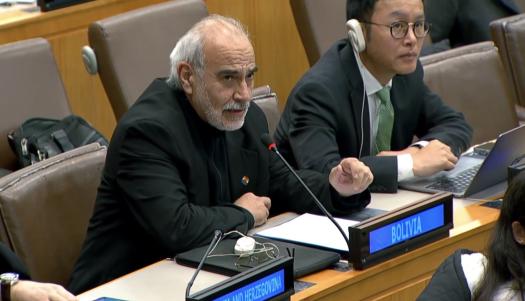 Geneva, Switzerland, 14 July 2016 – 23 June 2016 was a historic day for Colombia, its people and the region. Colombia opted for a long-awaited peace that was lost more than 50 years ago. Colombia and its people will now enjoy the right to peace and security, in order to achieve a full life in harmony and prosperity.
Geneva, Switzerland, 14 July 2016 – 23 June 2016 was a historic day for Colombia, its people and the region. Colombia opted for a long-awaited peace that was lost more than 50 years ago. Colombia and its people will now enjoy the right to peace and security, in order to achieve a full life in harmony and prosperity.
The Indigenous Peoples of Colombia may now be able to exercise their individual and collective rights and be able to return to their ancestral territories from which they were expelled.
As noted by the President of Colombia Juan Manuel Santos “The end of the conflict is the starting point to weave a rich tapestry of diversity and make Colombia a country where there is room for everyone.”
Achieving this historic step is essential in the building of a new Colombia, and it will allow Indigenous Peoples to participate effectively in decision-making to exercise their right to determine and develop priorities and strategies for exercising their right to development and respect for their autonomy and ancestral territories. Only an inclusive dialogue to achieve real consensus will allow for a lasting and sustainable peace. For this exercise, the government of Colombia has international instruments such as the UN Declaration on the Rights of Indigenous Peoples, Convention No. 169 of the International Labour Organization and its own national standards such as the 1991 Political Constitution for guidance.
Indigenous Peoples have been and remain the most notorious victims of armed conflicts. Therefore, the Permanent Forum has expressed its serious concern regarding the continuation of conflicts in various parts of the world that affect Indigenous Peoples, including areas where established treaties, agreements and other constructive arrangements exist. The Permanent Forum has continually urged for dialogue and achieving consensus for resolving such disputes, guided by the principles of the UN Declaration on the Rights of Indigenous Peoples. The Forum has also urged the United Nations system, including country offices, strongly support and promote these processes of dialogue and consensus building.
Last May, during the 15th session of the Permanent Forum, recommendations were made to States to take measures to provide protection and security in the aftermath of conflict, to build a lasting peace, and to promote the full and effective participation of Indigenous Peoples, including Indigenous women, in any initiative for peace and reconciliation.
I am sure that international observers appointed by the United Nations Secretary-General and the international community support the efforts of the government of Colombia in this process. On our side, the Permanent Forum is open to receiving positive news of what has been achieved in this process during the sixteenth session of the Permanent Forum in 2017.
 Welcome to the United Nations
Welcome to the United Nations


